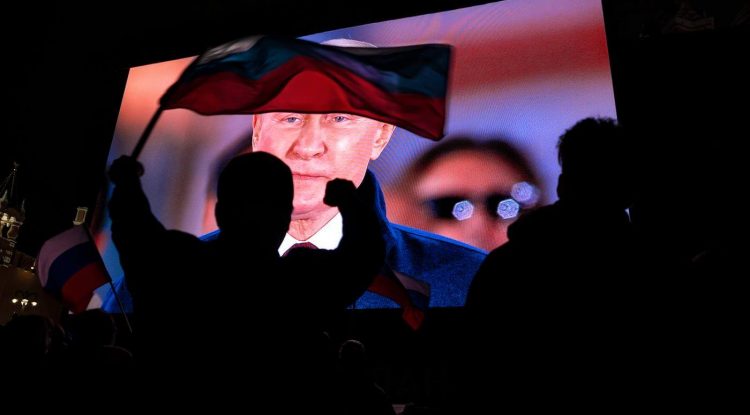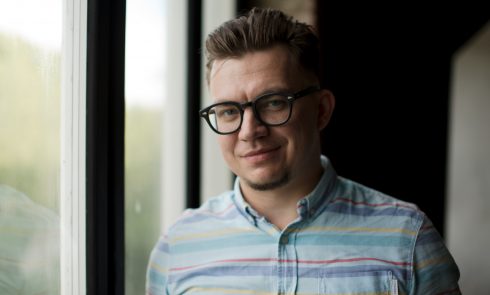In May 2022, Denis Grekov, professor of the Critical Thinking course at the Russian Presidential Academy of National Economy and Public Administration, compared Russia to the Third Reich in his Facebook post. His colleague, professor Natalia Tanshina, noticed this, after which Grekov was called to the dean's office and, according to his words, forced to write a letter of resignation. Soon after, Grekov left the country, fearing criminal prosecution. Holod asked him to explain why he believes Russia does not live under the threat of fascism, but rather in the fascist reality.

Putin's regime has long been called fascist by many of its opponents. After the invasion of Ukraine, these comparisons have become much more frequent. For example, in an interview with the BBC, former Ukrainian President Leonid Kuchma drew an analogy between the 4 a.m. German attack on Kyiv in 1941 and the Russian bombing of the Ukrainian capital on February 24, 2022. This is, of course, a symbolic analogy, but there are more grounded arguments in favor of Russia actually being fascist.
Yale University history professor Timothy Snyder is convinced of it: he explains that a regime can be called fascist if it uses psychological methods to manipulate the masses. For example, fascism must be characterized by the cult of one leader—in our case, Vladimir Putin. As the second sign, the scientist mentions consolidation around the cult of the dead—in Russia this cult is built around the victory in World War II. Finally, the state ideology should contain the myth of a lost “golden age” of the empire, which it now has to restore through a military victory over its enemies.
In general, it is not that important how much a new system resembles the regimes of Hitler or Mussolini. If the mechanics of its political governance contain the elements listed above, then, in the historian's opinion, it is fascist. Nevertheless, so far there has been no consensus among scholars regarding present-day Russia. I will try to expand on their arguments.
Timothy Snyder's idea of defining the nature of a regime by the mechanics of retaining power seems rational. Aristotle was the first to propose this method. In his Politics, among other things, he distinguishes two forms of people's power: “polity” and “ochlocracy.” “Polity” corresponds closest to modern representative democracy, that is, the power of the elected and “most worthy” representatives of the people. While ochlocracy” is the rule of a mob, controlled by demagogues through indulgence of its passions. Such a government behaves like a tyrant, albeit a collective one, and violates all laws to please their desires. It destroys the best, it is guided by passions and has no limits in this. This description is probably suitable for defining regimes based on the imitation of democracy and ruling the people with the help of propaganda.
Let's move on.
Alexis de Tocqueville made an important step in researching and describing fascist and totalitarian regimes. A French aristocrat, in the early nineteenth century he studied American democracy in detail, comparing it to government practices in France after the Revolution and the Napoleonic Wars. Historically, it was by these two paths that the masses came to politics, through the formation of American democracy in the New World and through the French Revolution in the Old World. De Tocqueville captured that, in American society, the dictatorship of the mob (expressed in the demand for total equality) is balanced by safety mechanisms: they protect the freedom of the individual, depriving the majority of the possibility to force or impose its political will on the individual. If this balance is disrupted, then, according to de Tocqueville, we will be faced with “a despotism of a new type never seen before,” in which total equality will turn into the enforcement of certain feelings and thoughts. And, in the end, universal equality would turn into total rightlessness.
This description provides the first insight into the essence of totalitarian and fascist regimes, degenerated forms of democracy in which freedom is sacrificed to equality. Democracy understood as a “dictatorship of the majority” is no longer democracy. In this we can see similarities between Stalin's and Hitler's regimes, for example.
One of the main characteristics of fascist regimes is their claim to totality. Totality should be understood here as collectivity aspiring to be individuality. In its ideal realization, it looks as if the individual does not have any desires or mental processes that contradict or do not coincide with the collective. The subject is perceived as an organism cell with no independent sense of existence, which is completely subordinated to the “whole” and its tasks. One of the founders and ideologists of Italian fascism, philosopher Giovanni Gentile, insisted on this scheme of governance as its distinctive characteristic. In his logic, the inner world of the individual must be completely subordinated to the historical mission of a monolithic people (as an exceptional nation, of course). The mission itself is inherent in the people “organically”due to the logic of the historical process.
In fact, this same logic of the “total political body” and its “natural” tasks is the basis of the ideas of German fascism with its concept of “living space”, Lebensraum, or the Bolshevik-Stalinist project of spreading communism as an “objective historical process”. In The Origins of Totalitarianism, Hannah Arendt articulated that every totalitarian movement not only wants to put an end to any independent form of agency, but goes further, seeking to find its own agency in everyone. This is why all mass regimes primarily try to establish themselves as a version of the consciousness of the individual. Not to order but to convince, to make the individual believe that its demands are his or her own aspirations. The principle of totalitarian cults, but the scale is larger. This is the key difference between fascism (or totalitarianism) and the usual dictatorship, which strives to simply suppress and impose its domination.
It is important to note that the main social forms of thinking of Russians are inherited from the Soviet experience. This is where the so-called negative identity was formed, deeply researched by the Levada Center. Lev Gudkov has compiled an entire book of articles about this phenomenon.
This negative identity has several characteristics. The first is a resentment about the exceptionality of Russians, which everyone around us allegedly envies and seeks to discredit. The second is a negative fixation on values: through the fear of losing, rather than through the possibility of gaining. The third is a tendency to attribute failure to external circumstances or hostile forces, not acknowledging one's mistakes. The fourth is a denial of the worth of any alternative experience or a different point of view.
Therefore, people are inclined to perceive any other agency as alien, if not hostile. Totalitarian propaganda instills the distrust of human beings in general, and forms a paranoid tendency to see hostile or treacherous intentions around us—in general, it imposes the idea that “we are encircled by enemies.”
All of this inspires the morality of collective self-preservation, described by the German philosopher Peter Sloterdijk. According to this morality, the individual must sacrifice everything for the physical survival of the collective. Personal identity is devalued and total collectivism prevails. The individual is seen as an instrument for the survival of the community, and the community is represented by power and the state and takes unconditional precedence over any existential or ethical doubts.
Stalin's regime, for example, relied on these mechanics to maintain and exercise its power. Here is a classic expression of it: “The Soviet country needs people with an inflexible will, who know no fear or hesitation in the struggle with the enemies of the revolution, who are ready to sacrifice their lives for the Lenin-Stalin cause. We have millions of such people, such is our Soviet youth.”
Putin's regime, first acting as an authoritarian and then as a dictatorship, placed more and more bets on the exploitation of post-totalitarian social forms of thinking as it developed. I should note that this trend has existed for a long time and has been ideologically shaped since the early 1990s in the writings of Alexander Dugin. From an academic point of view, Dugin is simply a marginal and an omnivorous eclecticist, combining the Eurasianism of Nikolai Trubetskoy with the passionarity concept of Lev Gumilev, and the fascist ideologies of Gentile-Junger with various conspiracy theories. However, in terms of how his ideas have been perceived by some groups of the Russian political and military leadership, he is a political philosopher and ideologist. Putin often uses the terms and concepts coined by Dugin, like “state-civilization”, in his speeches. In his historical thinking, the president relies on Dugin's ideologeme of Russia’s confrontation with the hostile forces from the West, a confrontation to which Russia is predestined by something little short of a divine plan. Such ideas are an adaptation of Gentile's concept of a “special historical mission”.
No matter how you look at it, we see a formed fascist ideology in Russia, which is no better than the ideology of the Third Reich or Italian fascism, and moreover, it is supported by the post-totalitarian social forms of thinking.
This explains the steps taken to establish a pseudo-historical picture of the world under the disguise of a “real” historical memory. For example, we remember how, as part of the fight against the “distortion of historical memory,” Russia introduced a non-criminal (so far?) punishment for equating the Soviet Union with Nazi Germany. Or Memorial, the key NGO that documented the crimes of Stalin's totalitarian regime, was destroyed. The Putin regime's very reliance on propaganda and pseudo-historicism has become an executive mechanism for exercising power. It is precisely propaganda and total censorship that are now providing the psycho-economic mechanics for waging war and putting the country's life on a mobilization track.
At the same time, this propaganda, fascist in its essence, presents itself as anti-fascist, using the terms “nationalists” and “Ukronazis” in reference to both the armed forces of the enemy, and to the Ukrainian people as a whole. Here we see that same totality and the claim to dominate the psyche and consciousness of the citizens. Based on these observations, we can indeed identify Putin's current propaganda as fascist. At least by its function.
So can we call Putin's regime fascist? I would say yes. It relies on manipulating the masses with the help of mental control and deprivation of individuality in favor of a total society, the very methods which have been tested in fascist and totalitarian models. The authorities rely on an adapted fascist ideology. The militarized state uses propaganda and hatemongering as a tool to control the masses in order to solve purely military tasks at the expense of the country’s future and the interests of its citizens.
The forces for the hybrid war that began in 2014 were recruited from the most patriotic social groups. They became bodies similar to the Italian squadristi, the German Sturmabteilung of Röhm, or the Freikorps in the early stages of the formation of German National Socialism. In general, similar to the forces with which the “canonically fascist” regimes waged their hybrid wars or fought for power within the country.
Another feature of fascist totalitarian political regimes is the so-called facade, as described by Hannah Arendt. Its essence is that the real drive belts of the exercise of power work in disguise. For example, Stalin's Soviet Union had a very progressive Constitution. But this did not prevent millions of people from being shot or sent to concentration camps as slaves. The troikas imitated the trial processes rather than implemented the law. In other words, the reality was hiding behind a certain facade.
In the current incarnation of Putin's regime, we see the same effects: judges, for example, impose their sentences according to the logic of the system, ignoring not only the law, but simple common sense. The police torture and rape anti-war activists, i.e. they use extrajudicial violence. Procedural rules are just a facade. The actions of the authorities are not governed by laws, and laws are passed to suit the objectives. This is called emergency governance, a governance without laws. We are already observing it.
Of course, it is possible to identify features of Putin's system that do not fall under the scientific characteristics of fascism. But they could also be found in the Italian and German regimes, which have all the same gone down in history as fascist ones. Today’s Russia is close to getting itself into the textbooks under the same terminology.
The opinion expressed in this publication is that of the author and does not necessarily reflect Holod’s opinion.



